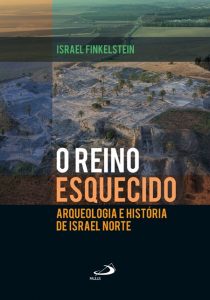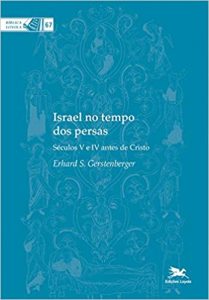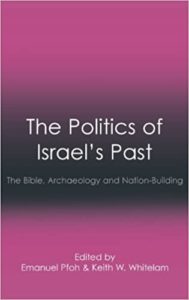Confira em AWOL – The Ancient World Online aqui.
CLASSICSINDEX: Links to Online Books (Google Books, Archive.org, etc.)
For the Study of Greek and Roman Classics, Early Judaism, and Christianity
Publicado por AWOL em 06/06/2014
Blog sobre estudos acadêmicos da Bíblia
Confira em AWOL – The Ancient World Online aqui.
CLASSICSINDEX: Links to Online Books (Google Books, Archive.org, etc.)
For the Study of Greek and Roman Classics, Early Judaism, and Christianity
Publicado por AWOL em 06/06/2014
RÖMER, T. La Bible, quelles histoires!: Entretien avec Estelle Villeneuve. Montrouge/Genève: Bayard Éditions/Labor et Fides, 2014, 288 p. – ISBN 9782227482203.
Sobre o livro, publicado agora em fevereiro de 2014, escreve Christophe Lemardelé em Désacraliser la Bible par l’histoire: Mediapart: 02/03/2014
(…) L’ouvrage dont il est ici question est à même d’opérer cette même entreprise de «vulgarisation» – en fait, de mise à disposition du grand public – des connaissances scientifiques sur l’objet «Bible» car c’est un entretien mené par l’archéologue, journaliste et éditrice Estelle Villeneuve avec le professeur Römer. Le «style oral» de cet ouvrage permet donc au lecteur de comprendre plus aisément des problèmes complexes comme la concurrence de mythes fondateurs (autochtonique et exodique) dans les deux premiers livres bibliques ou la référence à deux divinités distinctes (El et Yahvé, un chef du panthéon et un dieu de l’orage) en ce qui concerne l’émergence du monothéisme. Autant dire que la synthèse des recherches actuelles opérée par Thomas Römer dans ce livre a de quoi surprendre le lecteur qui aurait rangé la Bible dans la catégorie trop simple de la littérature pour croyants. Car les textes bibliques sont avant tout une littérature s’étalant sur presque un millénaire, bien que concentrée sur une période difficile à situer précisément (entre le vie et le ive siècle av. J.-C.), littérature historiographique qu’il s’agit de déconstruire historiquement afin d’en dévoiler les enjeux idéologiques.
Évidemment, le lecteur agnostique et étranger à la culture judéo-chrétienne peut très bien trouver totalement inutile de s’intéresser à des textes si anciens. Pourtant, le mythe de la terre promise autour d’un Moïse plus littéraire qu’historique et celui d’un grand royaume unifié sous David et Salomon – mythe déconstruit par l’archéologue Israel Finkelstein cette dernière décennie – n’ont cessé d’irriguer l’imaginaire idéologique de nations modernes comme les États-Unis ou Israël. On ne peut penser, comme on le faisait au siècle passé, que nos sociétés ne puisent leurs références que dans un passé proche. Le retour du religieux, si souvent évoqué de manière quelque peu prophétique, n’est en fait qu’une présence qui n’a jamais réellement disparu et qui peut être réactivée par des enjeux actuels. Il est donc important, comme le déclare Thomas Römer, de ne pas laisser ces textes aux seules communautés religieuses, ni même à tous ceux qui s’avèreraient prompts à en faire des interprétations très approximatives et totalement anachroniques. Non seulement les textes bibliques restent d’une importance cruciale dans notre présent politique, mais ils font en outre partie de notre patrimoine historique, au-delà donc d’un patrimoine culturel et religieux (continua)
Esta biografia do importante exegeta alemão Hermann Gunkel (1862–1932), escrita por Konrad Hammann, está sendo publicada agora, em fevereiro. Em alemão.
HAMMANN, K. Hermann Gunkel – Eine Biographie. Tübingen: Mohr Siebeck, 2014, XII + 439 s. – ISBN 9783161504464.
Diz a editora:
In der Generation nach Julius Wellhausen gehörte Hermann Gunkel zu den bedeutendsten Repräsentanten der evangelischen Bibelwissenschaften. Als einer der Mitbegründer und Hauptvertreter der Religionsgeschichtlichen Schule etablierte er methodisch höchst innovative Zugänge zum Alten wie auch zum Neuen Testament. Letztlich setzte er mit jeder größeren Publikation einen forschungsgeschichtlichen Markstein. Sein Kommentar zur Genesis und seine diversen Auslegungen der Psalmen avancierten zu Klassikern der protestantischen Bibelexegese im 20. Jahrhundert. Sein Name ist untrennbar verbunden mit der gattungsgeschichtlichen Betrachtung biblischer Texte. Im Rückgriff auf bislang unerschlossenes Archivmaterial verortet Konrad Hammann das Leben und Werk Gunkels in seiner Zeit und in den Forschungsdiskursen seines Faches.
In the generation after Julius Wellhausen, Hermann Gunkel was one of the most important exponents of Protestant biblical studies. As one of the co-founders and main advocates of the history of religions school, he established approaches to the Old as well as the New Testament which were highly innovative from a methodological perspective. Ultimately he set a milestone in research history with each of his major publications. It is no coincidence that his commentary on Genesis and his diverse interpretations of the Psalms became classics of Protestant biblical exegesis in the 20th century. His name is inextricably linked to the examination of biblical texts from the perspective of form criticism. Drawing on previously unexplored archive material, Konrad Hammann shows the extent to which Gunkel’s life and work were part of his time and the research discourses of his profession.
Todos os livros de introdução ao Antigo Testamento falam da contribuição de H. Gunkel para a exegese.
Acabei de ver no blog de Jim West, a quem agradeço.![WYATT, N. Religious Texts from Ugarit. 2. revised ed. London: Continuum, 2002 [Reprinted 2006] WYATT, N. Religious Texts from Ugarit. 2. revised ed. London: Continuum, 2002 [Reprinted 2006]](https://airtonjo.com/blog1/wp-content/uploads/2021/03/ugarit-1-231x300.jpg)
Está disponível para download gratuito, em formato pdf, na Academia.edu, a íntegra do livro de Nicolas Wyatt: Textos religiosos de Ugarit [Não está mais: tente aqui].
WYATT, N. Religious Texts from Ugarit. 2. revised ed. London: Continuum, 2002 [Reprinted 2006], 504 p. – ISBN 9780826460486.
Outro livro interessante com os textos de Ugarit, e que costumo usar, é:
DEL OLMO LETE, G. Mitos y Leyendas de Canaan según la Tradición de Ugarit. Madrid: Institución San Jerónimo & Ediciones Cristiandad, 1981, 699 p. – ISBN 9788470572975.
O livro de Israel Finkelstein, publicado em francês, acaba de sair também em inglês e está disponível para download gratuito no Projeto ICI da SBL, na coleção Ancient Near East Monographs.
FINKELSTEIN, I. Le Royaume biblique oublié. Paris: Odile Jacob, 2013, 288 p. – ISBN 9782738129475.
FINKELSTEIN, I. The Forgotten Kingdom: The Archaeology and History of Northern Israel. Atlanta: Society of Biblical Literature, 2013, 210 p. – ISBN 9781589839106.
Ele diz em agradecimentos / Acknowledgments:
The seeds of this book were sown in a series of lectures I gave at the Collège de France in February 2012. The series, delivered at the invitation of my colleague and friend, Prof. Thomas Römer, was entitled “The Emergence of the Northern Kingdom of Israel.” I wish to thank Thomas for his kind invitation, for his hospitality while I was in Paris, and for initiating the publication of this book. The book was first published in French under the title Le Royaume biblique oublié (Paris, 2013) by Odile Jacob for the Collège de France. This book is also based on many articles that I have written over the course of several years, some of them in collaboration with colleagues. I am indebted to four of them who have granted me permission to summarize parts of our articles in this book: Alexander Fantalkin (article on Khirbet Qeiyafa published in Tel Aviv 2012), Oded Lipschits (article on Jahaz and Ataroth published in ZDPV 2010), Nadav Na’aman (article on Shechem of the Late Bronze Age and the northern kingdom published in IEJ 2005), and Benjamin Sass (article on the spread of scribal activity in the Levant in the Iron I-IIA, to be published in Hebrew Bible and Ancient Israel). The preparation of this book was supported by the Chaim Katzman Archaeology Fund at Tel Aviv University. I am grateful to Myrna Pollak for her highly professional editing of the manuscript and to Alexander Pechuro and my student Maayan Mor for the preparation of the figures.
Lembro que alguns livros de Israel Finkelstein (e N. A. Silberman) estão também disponíveis para Kindle na Amazon.com.br, como The Bible Unearthed, David and Solomon e outros. Clique aqui.
Em 2005 foi publicado, na coleção Biblische Enzyklopädie, o livro de Erhard S. Gerstenberger sobre Israel na época persa. Em alemão: Israel in der Perserzeit: 5. und 4. Jahrhundert v. Chr. Stuttgart: Kohlhammer, 2005, 416 Seiten.
 Em 2011 saiu a tradução para o inglês: Israel in the Persian Period: The Fifth and Fourth Centuries. Atlanta: Society of Biblical Literature, 2011, xv + 575 p. – ISBN 9781589832657.
Em 2011 saiu a tradução para o inglês: Israel in the Persian Period: The Fifth and Fourth Centuries. Atlanta: Society of Biblical Literature, 2011, xv + 575 p. – ISBN 9781589832657.
A obra em inglês, assim como outras da mesma coleção, está disponível para download gratuito no projeto ICI da SBL.
Foram publicadas na RBL, em 15 de março e em 21 de junho de 2013, duas resenhas sobre o livro.
O livro foi publicado em português em 2014:
GERSTENBERGER, E. S. Israel no tempo dos persas: Séculos V e IV antes de Cristo. São Paulo: Loyola, 2014, 552 p. – ISBN 9788515040759.
O livro, em francês, é sobre o reino de Israel (do norte). É o resultado de conferências de Israel Finkelstein no Collège de France, Paris, em fevereiro de 2012. Foi publicado em 26 de abril de 2013.
Israel Finkelstein tenta, com os recursos da arqueologia, resgatar a história do importante reino de Israel, censurado pela Obra Histórica Deuteronomista escrita em Judá após a queda de Samaria em 722 a.C.
FINKELSTEIN, I. Le Royaume biblique oublié. Paris: Odile Jacob, 2013, 288 p. – ISBN 9782738129475.
Diz a editora:
Du Xe au VIIIe siècle avant notre ère, deux royaumes hébreux ont coexisté : Israël au nord, Juda au sud. Compilés à Jérusalem, capitale de Juda, à partir de la fin du viie siècle, les textes bibliques présentent le « Royaume du Nord » comme impie et ses rois comme maudits. Biblistes et historiens ont largement emboîté le pas : chacun savait qu’Israël était une entité politique et économique bien plus importante et puissante que le petit royau-me de Juda, mais on n’a jamais essayé d’écrire son histoire depuis ses origines jusqu’à sa disparition en 722. Archéologue hors pair du Levant ancien, Israël Finkelstein relève le défi et présente une histoire de ce royaume « oublié », voire « censuré ». Poursuivant la démarche de La Bible dévoilée et des Rois sacrés de la Bible, il offre une nouvelle version des origines d’Israël et nous permet aussi de mieux saisir comment les textes bibliques ont reconstruit son histoire.
Israël Finkelstein est professeur d’archéologie à l’Université de Tel-Aviv. Il est notamment l’auteur d’Un archéologue au pays de la Bible (2008) et – avec Neil Asher Silberman – de La Bible dévoilée. Les nouvelles révélations de l’archéologie (2002) et des Rois sacrés de la Bible. À la recherche de David et Salomon (2006). Le présent livre est issu de conférences qu’il a données au Collège de France en février 2012.
Leia Mais:
Israel Finkelstein no Observatório Bíblico e na Ayrton’s Biblical Page
Israel Finkelstein na biblioblogosfera
STEGEMANN, W. Jesus e seu tempo. São Leopoldo: Sinodal/EST, 2013, 576 p. – ISBN 9788562865886.
Sobre o original alemão, de 2010, leia meu post: Wolfgang Stegemann: Jesus e seu tempo.
O sumário e o prefácio do livro podem ser lidos, em pdf, na página do livro na Editora Sinodal.
Palestine is a land built on bones, where the dead are passed into the living.
WHITELAM, K. W. Rhythms of Time: Reconnecting Palestine’s Past. – ISBN 9780957540613.
Ebook previsto para fevereiro de 2013. Estará disponível na Amazon (para Kindle), Apple iBookstore (para iPad), Barnes and Noble (para Nook), Reader Store (para Sony Reader), Kobo (para Kobo Touch, Kobo Wi-Fi, Kobo Vox) etc.
The history of Palestine has been forged in the shadow of empire: the Egyptian, Assyrian and Babylonian from the ancient past to the Ottoman, British and American of the modern world. The so-called great men, monarchies, and imperial powers have followed on from one another in the region, attracting most attention like the froth of the waves breaking on the shoreline. Yet underlying this surface movement, as Braudel termed it, was a substratum that moved slowly to the rhythms of time absorbing and dissipating the effect of the waves. It is this story, an essential part of Palestine’s past, that was ignored by western visitors and scholars in favour of the events and characters described in the Bible. So these centuries that are associated with the biblical stories have become Israel’s past and have been denied to Palestine and the Palestinians (trecho do capítulo 2).
Veja o sumário do livro.
Keith W. Whitelam é professor emérito de Estudos Bíblicos na Universidade de Sheffield, Reino Unido.
Sem dúvida, na história da Palestina, arqueologia, religião e política se encontram…
PFOH, E.; WHITELAM, K. W. (eds.) The Politics of Israel’s Past: The Bible, Archaeology and Nation-Building. Sheffield: Sheffield Phoenix Press, 2013, 270 p. – ISBN  9781907534829.
9781907534829.
O livro A política do passado de Israel: a Bíblia, a arqueologia e a construção da nação trata de duas questões:
. como e em que grau a atual política israelense afeta o conhecimento do antigo Israel?
. como as tentativas de reconstrução histórica do antigo Israel legitimam as opções políticas do Israel atual?
Além de Emanuel Pfoh e Keith W. Whitelam, participam do livro: Ingrid Hjelm, Philippe Wajdenbaum, Thomas L. Thompson, Firas Sawah, James G. Crossley, Niels Peter Lemche, Gideon Sulimany, Raz Kletter, Terje Oestigaardv e Nadia Abu El-Haj.
It is not uncommon that historical images — presented as simply given, self-evident and even indisputable — are employed in political readings of the past and used as a legitimizing tool. For that reason, the authors of this volume, biblical scholars, archaeologists, anthropologists and historians, undertake a deconstruction of modern biblical discourses on the Bible’s production and the history of ancient Israel, enabling the exploration of critical approaches to ancient Palestine’s past, to the history of the peoples of the region, to the history of the biblical text(s) and, last but not least, to the modern political uses of biblical narratives as legitimizing land ownership and nationalisms. Among the topics treated are the appearance of Judaism and its connection to the production of biblical literature, the politics of archaeological practice in Israel, the role of archaeology in the production of nationalist narratives of the past, the relationship between genetic studies and Jewish nationalism, and the prospects for writing critical histories of ancient Palestine beyond biblical images and religious and political aspirations. Each article illustrates the close relationship between the Bible, archaeology and processes of nation-building in the State of Israel. The Politics of Israel’s Past concerns itself both with the ways in which contemporary politics affects the knowledge of the past and with the processes by which constructions of an ancient past legitimate modern political situations.
Emanuel Pfoh teaches in the Department of History, National University of La Plata, Argentina. Keith W. Whitelam is Professor Emeritus of Biblical Studies in the University of Sheffield.